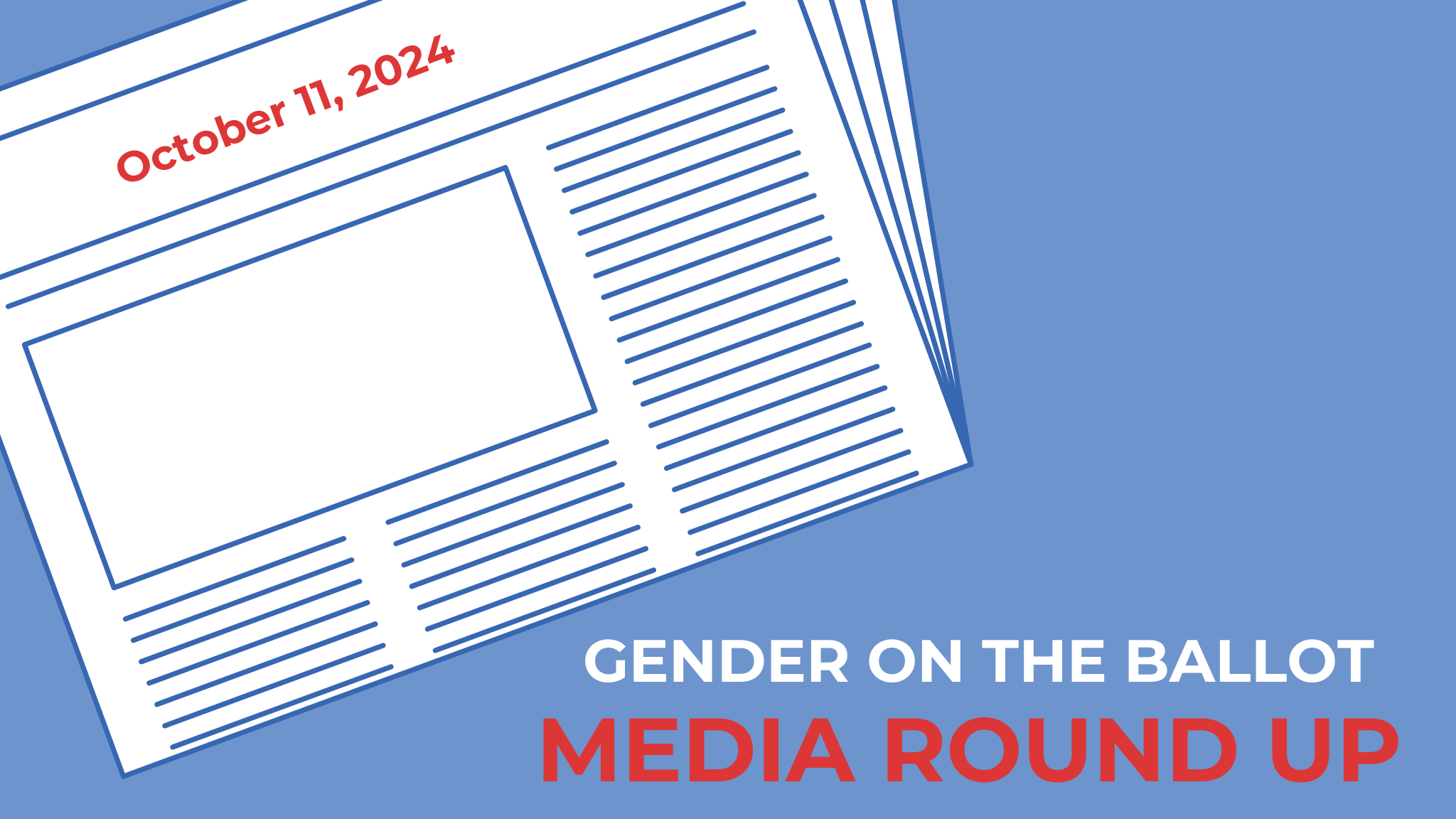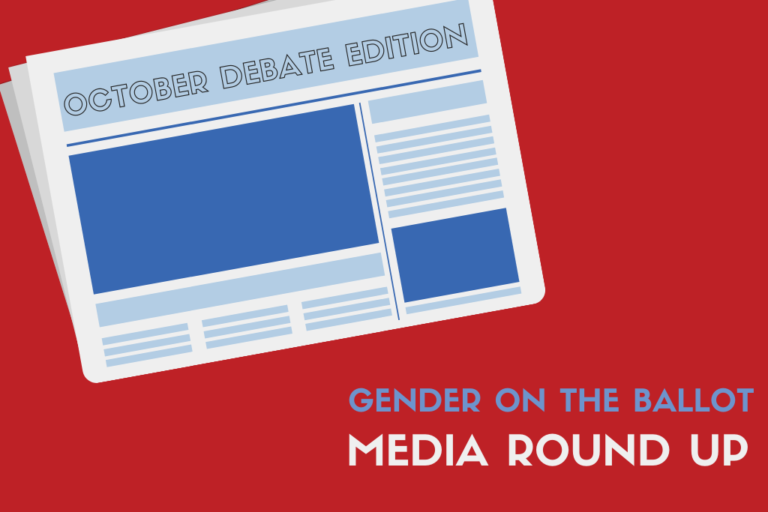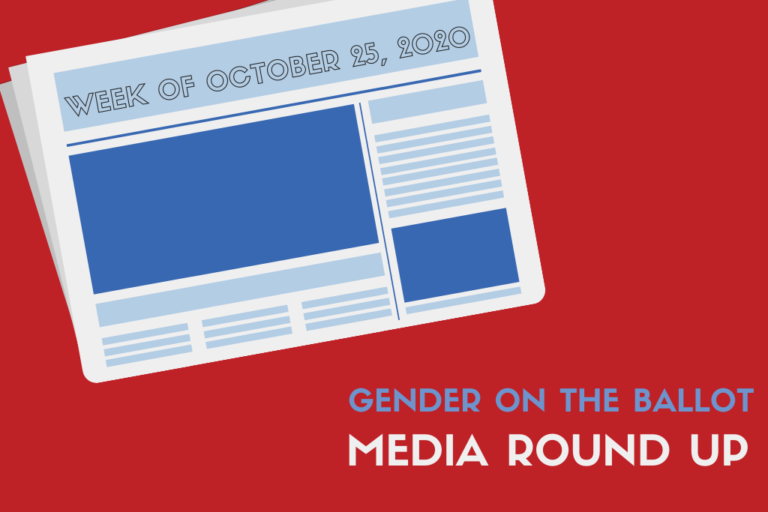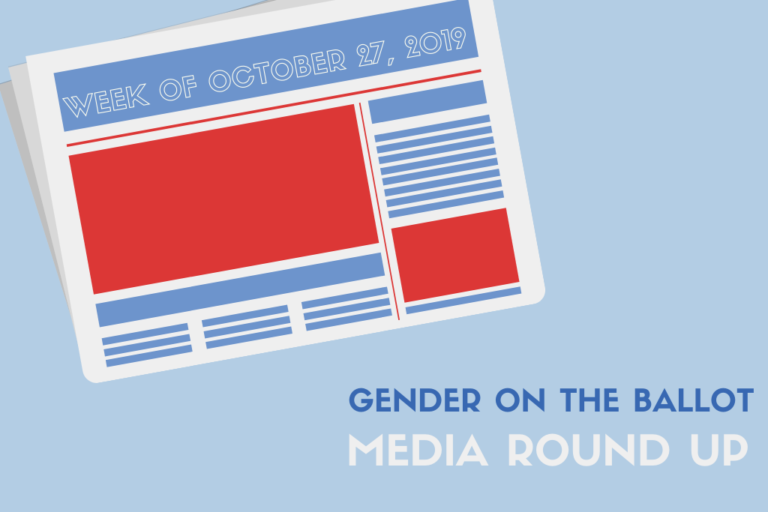Happy Friday! Welcome to our Media Round Up: Debate Edition. Each week we’re collecting…
Weekly Media Round Up: October 11, 2024

Happy Friday! Welcome to our Media Round Up. Each week we’re collecting and sharing our favorite gender + politics stories.
How Gender Became the Election’s Crucial Fault Line
The New York Times, Emily Bazelon
The 2024 election cycle has been anything but normal, and the growing gender gap is no exception. Vice President Kamala Harris has walked the delicate line this cycle by acknowledging her gender without exploiting it, while former President Donald Trump has done the opposite: the more masculine, the better. Trump and his Vice President pick Senator JD Vance have launched several attacks against Harris by calling her “stupid”, “dumb as a rock”, and “miserable”. Harris has largely stayed silent in this gender feud, while her running mate Governor Tim Walz has repeatedly called the right “weird.” With Harris and Walz having a large lead among women voters, it leaves Trump and Vance to capture the male vote. As Jennifer Lawless, former Director of AU’s Women & Politics Institute, puts it, “The gender gap can ultimately sway the election…when Democrats exploit it, they win, and when Republicans mitigate it, they win.” Lawless also observes “an important change in the political environment,” whereby women running for president no longer engender paralyzing angst about their viability as candidates. The gender gap could rewrite conventional wisdom about women and politics.
Kamala Harris Is Doing Something Brilliant Up There on the Tightrope
The New York Times, Alison Fragale and Adam Grant
Vice President Kamala Harris has more to prove this election than just her policy positions: a quiet, strong warmth. She has to shed some of her perceived coldness in favor of a softer image, but not one that’s weak. It all represents the challenge that women in politics, and any positions of power, face in building their public image. Harris has resisted the relentless attacks from former President Trump and his supporters about her race and personality, instead opting for a polite, but firm, refusal to acknowledge it. It shows the tightrope that Harris has to constantly walk to conquer public perception, as some blast her for being too cold, others too affable, and some as unserious. Nevertheless, projecting care along with confidence is a winning combination – for women as well as for men.
The ‘Pragmatic Optimist’ Set to Make History in a Divided Senate
The Washington Post, Paul Kane
“Cheerful optimist” Lisa Blunt Rochester is favored to make history this November by becoming Delaware’s first woman in the Senate and just the fourth black woman to ever serve in the chamber. Blunt Rochester’s bipartisan approach to lawmaking feels “somewhat anachronistic in an era where so many live for trolling the opposing party on social media.” She simply calls herself a “pragmatic optimist,” determined to turn bad situations into positive outcomes. Eager to bring this spirit into a Senate that has atrophied, Blunt Rochester believes that “we’re here for a minute. What did you do with it?”
Alsobrooks Leading Hogan by 9 Points in Maryland Senate Race: Poll
The Hill, Ashleigh Fields
Angela Alsobrooks, Democratic candidate for Maryland’s contentious Senate race, is leading over Republican candidate Larry Hogan in a new poll. She leads with 9 points above Hogan, the former governor of Maryland – 48% of likely voters to his 39%. However, these results demonstrate the importance of reading polls in their entirety; Hogan has a 4 point lead over Alsobrooks in how favorably each candidate is viewed with his 53% to her 49%. At the same time, he also leads with having an unfavorable view among voters, with 42% to Alsobrooks’ 32%. Others report having no positive or negative view of either candidate. In order to understand a poll completely, it is always important to read beyond the headline.
Will White Women Abandon Republicans and Vote for Harris?
The Guardian, Carter Sherman
Polls indicate that white female voters, who have long been the backbone of the Republican party, may not support their party as fervently as they once did. Younger white women voters are moving to the left at a “breakneck speed” due, in part, to abortion rights and the issue of reproductive healthcare. AU Alumna Dr. Melissa Deckman, SPA/Ph.D. ‘00, who serves as CEO of the Public Religion Research Institute, believes that Kamala Harris’s selection as the Democratic nominee has “really further made them [younger white women voters] enthusiastic about voting.” She strongly suspects that “young, white women voters are going to defy the longer-term trend of white women in general voting for Republicans.”
*Hear more from Melissa, who will be discussing her new book, The Politics of Gen Z: How the Youngest Voters Will Shape Our Democracy, with WPI on October 28th. Details and registration here.
Abortion Exceptions Don’t Really Exist
Rolling Stone, Jessica Valenti
Though many states that restrict abortion access have “exceptions” codified into law, Rolling Stone explores how these exceptions are deliberately crafted to be impossible for women to practically use. Contending that the only reason these exceptions exist at all is to make GOP lawmakers seem “a little less punishing,” the article explores how common abortion exceptions – such as rape and incest, nonviable pregnancies, and protecting the life of the mother – allow conservatives to “pretend as if they’re generously allowing vulnerable women abortions, even as they force them to beg for care.” Since support for access to abortion is high when the mother’s life is in danger or the pregnancy is nonviable, the article posits that Republican legislators are focusing on exceptions to “finally have an abortion stance that’s popular.”
Where Are Women in Our Emerging Industries?
Women have always had a smaller representation in Science, Technology, Engineering and Math (STEM) fields, and emerging industries are no exception. New findings show the bleak reality. With the shift to cleaner energy, women are poised to lose job opportunities due to the lack of female graduates in STEM degrees. The fewer women with these degrees, the fewer going into male-dominated green jobs like engineering and energy, and the greater loss for female jobs as the world works towards a greener place. To curb this, academics need to boost women’s enrollment in STEM programs. On the opposite side of the workforce, women are creating an industry called “femtech”—one that focuses on female health problems with technology to solve them. Yet, despite the need for these products, its founders are not able to secure funding, insurance policies, and vendor platforms due to the nature of their business. Femtech is a rapidly growing industry, but it’s being halted at nearly every corner due to their “crass” language (female anatomy) and refusal of investors to advertise. In a world trying to evolve, women are being left behind in industries that desperately need our touch.
Is the Trump Campaign’s Male-Dominated Culture Losing Women Votes?
The Washington Post, Isaac Arnsdorf, Josh Dawsey, and Ashley Parker
While Donald Trump’s campaign speculates that they can win the White House by projecting a sort of masculine strength and “distinctly aggressive vibe,” some Trump allies fear this strategy may be contributing to a persistent gender gap in which he trails far behind Vice President Kamala Harris among women voters. Current and former advisers have discussed the lack of women surrogates publicly supporting Trump and the desire to recruit more, while others – such as former RNC chairwoman Ronna McDaniel – have claimed that the campaign is too “male-dominated.” Though his campaign has taken steps to try to soften his image, including featuring photographs with his grandchildren, some strategists fear the culture surrounding his campaign may not be enough to bridge the gap and secure this vital voting bloc in November.






